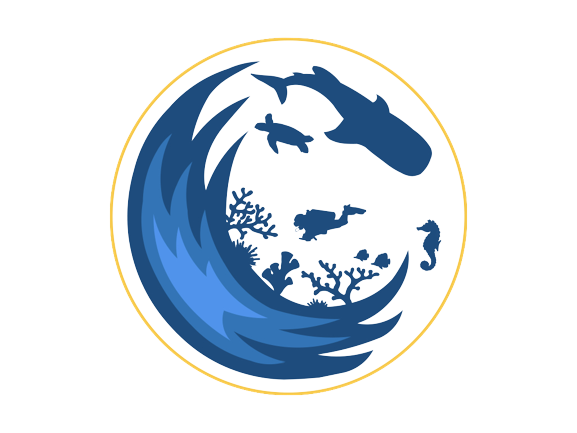

| Day 1 | Classroom Knowledge Session |
| Day 2 | Pool Training |
| Day 3 | Ocean Check-out Dives |
| Day 4 | Ocean Check-out Dives |
| Day 1 | Ocean Check-out Dives |
| Day 2 | Ocean Check-out Dives |
DEEP LEVEL 0
| 1 | DEEP & TOCO Intro |
| 2 | Rare Earth Theory |
| 3 | Water |
| 4 | Marine Origin of Life |
| 5 | REEF Ecology 101 |
| 6 | Reign of the Eukaryotes |
| 7 | Human Influences |
| 8 | Cnidarian Taxonomy 1 |
| 9 | *Floating RAID Lesson* |
| 10 | *Floating RAID Lesson* |


DEEP Level 1
The Ocean Program of this level is called EARLY RESEARCH - a 2-day program
The introductory course at DEEP provides the basics in reef monitoring and marine animal identification. In this course, students are introduced to the Ecological Monitoring Program (EMP) by Conservation Diver, a leading marine conservation and education certification body. The EMP takes students through collecting reef transect data on invertebrates, vertebrates, and coral health over 4 lectures and 4 dives. The EMP protocol has been used in scientific publications and discoveries for over a decade across the Indo-Pacific and students will develop key skills in pursuing a DEEPer level of marine science education.
DEEP Level 1
The Classroom Program Level 1 is called A Home for Life, this unit is divided into 10 separate lessons
| 1 | Extinction & Opportunity |
| 2 | Weathering & Erosion |
| 3 | Salinity & Osmoregulation |
| 4 | Fish Classification |
| 5 | Plate Tectonics & Abiogenesis |
| 6 | Prokaryotes & Endosymbiosis |
| 7 | Coral Symbiosis |
| 8 | Cnidarian Taxonomy 2 |
| 9 | Coral Spawning & Colonisation |
| 10 | Ecological Monitoring Program (EMP) |


DEEP Level 2
Artificial reefs and substrate creation are key methods of coral conservation throughout the tropics. By taking the next step in DEEP, students will learn about the impacts and importance of artificial substrates and coral restoration, be able to construct their own structures, and will help deploy some into the marine environment. Additionally, students will learn about some of the pioneering research involving the future of coral reef recruitment on these substrates and how these may be used as tools in a world of changing climates.
DEEP Level 2
The Classroom Program Level 2 is called ENERGY & COMPETITION, this unit is divided into 10 separate lessons
| 1 | Chemosynthesis & Photosynthesis |
| 2 | Respiration |
| 3 | Gas Exchange |
| 4 | Feeding Relationship |
| 5 | Biofuel & Fouling Organisms |
| 6 | Nutrient Cycle |
| 7 | Eutrophication |
| 8 | Cnidarian Taxonomy 3 |
| 9 | *Buffer Lesson* |
| 10 | Artificial Reefs |


DEEP Level 3
The Ocean Program of this level is called REEF ECOLOGY 101 - a 2-day program
The study of ecology looks at how different organisms in an ecosystem interact and influence one another. The third level of DEEP sees students exploring some fundamentals in reef ecology including a first look at some threats to reefs around the world. Here, lectures will touch on topics pertaining to symbiosis, competition, and predator/prey relationships. Examples of these will be independently explored across reefs with vastly different communities and stress levels as a window into the variability and often fragility of these important ecosystems.
| 1 | Tides & Currents |
| 2 | Sandy & Rocky Shore |
| 3 | Open Ocean |
| 4 | Upwelling & El Nino/ La Nina |
| 5 | Tropical Reefs |
| 6 | Mangroves |
| 7 | Human Impact & Biodiversity |
| 8 | *PROJECT DEVELOPMENT* |
| 9 | *PROJECT DEVELOPMENT* |
| 10 | Competition & Stress |


DEEP Level 4
The Ocean Program of this level is called MODERN DAY EXPLORERS - a 2-day program
After a comprehensive introduction to the coral reef, students who have advanced to the fourth level will be able to participate in real-world research by heading into muck habitats, the home of seahorses, sea slugs, cuttlefish, and more. Our own marine science team from ATMEC has conducted several years of research, discovering and describing several new species from these complex sandy-bottomed habitats beyond the edge of coral reefs. Lectures on seahorse and nudibranch biology are followed by underwater surveys and laboratory analyses of sediment samples taken by students.
The Classroom Program Level 4 is called ENVIRONMENTAL MONITORING, this unit is divided into 10 separate lessons
| 1 | Measuring Diversity |
| 2 | Sampling Techniques |
| 3 | Keystone Species |
| 4 | Populations & Changes |
| 5 | Climate Change |
| 6 | Ocean Acidification |
| 7 | *PROJECT DEVELOPMENT* |
| 8 | *PROJECT DEVELOPMENT* |
| 9 | *PROJECT DEVELOPMENT* |
| 10 | Muck Diving & Sediments |


| 1 | Coral Bleaching |
| 2 | Mangrove Removal |
| 3 | Agricultural Runoff & Sewage |
| 4 | Plastic Pollution |
| 5 | Overfishing & Fish Populations |
| 6 | Overconsumption |
| 7 | Conservation |
| 8 | *PROJECT DEVELOPMENT* |
| 9 | *PROJECT DEVELOPMENT* |
| 10 | Safe Net Removal |
